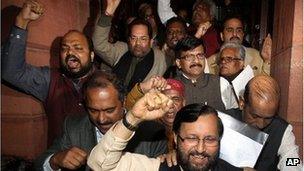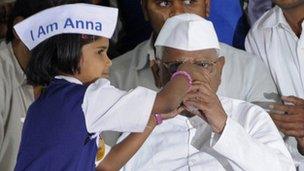Criticism after India corruption bill vote delayed
- Published

Parliament was adjourned amid chaotic scenes - and without a vote
India's opposition parties have bitterly criticised the government for its failure to put the controversial anti-corruption Lokpal bill to a vote in the upper house of parliament.
But the government insists that the opposition BJP was responsible for the bill not being passed.
The house was adjourned amid chaos after a debate stretched to midnight.
The BJP said the government had "orchestrated" the chaos as it was not sure it could pass the bill.
But Parliamentary Affairs Minister Pawan Kumar Bansal told reporters that if the BJP wanted the bill to have been passed, "it could have been passed without any problem".
"But they were not willing to co-operate. They would rather see the nation fail than the government succeed."
The Lokpal bill gives an independent ombudsman powers to prosecute politicians and civil servants.
The bill passed the lower house on Tuesday. It needed to be passed in the upper house on Thursday in order to become law.
The bill will now have to be revised and presented again.
The government said it had respected the constitution with the adjournment at midnight and that the people of India would know who was responsible for the failure to reach a vote.
But the BJP immediately called on Prime Minister Manmohan Singh to resign, saying his government had shown it was not fit to rule.
"The government has lost all moral right to continue in power. It should resign immediately," opposition leader Arun Jaitely told reporters.
"The [ruling] Congress [party] was never serious and committed to bring a strong Lokpal. It knew that it would never be able to get the bill passed in the lower house, so it choreographed the entire drama of debate which continued till midnight," he said.
'Moral defeat'
The ruling alliance has 94 members there and needed a simple majority of 122 MPs to ensure the passage of the bill.
Communist Party of India (Marxist) leader Sitaram Yechury said the adjournment was "big moral defeat" for the Congress party.
He said if the government was "serious about the passage of the bill, it should have taken the opposition parties in confidence".
Sukhendu Roy, a leader of the Trinamool Congress party, which is an ally of the ruling government, also criticised the adjournment of the vote, saying it was a "shameful" day for democracy and a result of "orchestrated chaos".
The ruling Congress party, however, said that with nearly 200 amendments to the bill demanded by the opposition it ran too late because the winter session of parliament ended at midnight.

Mr Hazare has broken his fast, but pledged to protest against the bill
"How can a government pass a bill with so many amendments without studying it and examining it? It was a pre-planned move by the BJP to discredit the government," the junior minister for parliamentary affairs Harish Rawat told The Hindu newspaper.
The debate has not only been heated in parliament.
Leading anti-corruption campaigner Anna Hazare has called the bill "useless".
He had started another hunger strike but has since called it off and threatened instead to launch a campaign of civil disobedience that would fill the country's jails.
Mr Hazare and his supporters say that tougher measures are required in the bill if it is to prove effective at reducing the level of corruption.
Mr Hazare's main complaint is that the bill proposes keeping India's top investigation agency, CBI, out of the purview of the ombudsman.
A recent survey said corruption in India had cost billions of dollars and threatened to derail growth.
- Published30 December 2011
- Published3 December 2011
- Published18 April 2012
- Published7 June 2011
- Published1 December 2011